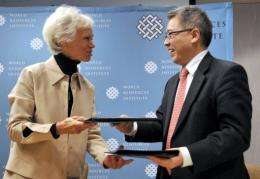China looks at carbon tax, official says in US

China's lead negotiator on climate change said Wednesday that the world's largest emitter is considering imposing a tax on carbon to reduce the use of dirty energy as its economy grows.
Su Wei, on a visit to Washington, said that the fast-developing Asian power was looking at the impact of an outright tax on carbon and whether it would overlap with China's plans for a pilot scheme on carbon emissions trading.
"I think that the carbon tax is one of the instruments that can be used in order to direct (the economy) to low-carbon development," Su Wei told reporters on a visit to the World Resources Institute, a think-tank.
Su, director general of the climate change department at China's powerful National Development and Reform Commission, said officials had not taken a final decision and were debating whether to use the term "carbon tax."
"Whether we call it a carbon tax -- or environment tax or resource tax or even fuel tax -- we have lots of taxes already. We need to carefully redesign the category and type," he said.
Chinese state media said last week that a proposal submitted to the finance ministry would impose a tax of 10 yuan ($1.59) per ton of carbon within the next three years, targeting large users of coal, oil and natural gas.
In a speech to the institute, Su said that China was also looking at a plan to put voluntary labels on low-carbon products "in order to try to give a clear signal to business and industry."
China has surpassed the United States as the largest emitter of the greenhouse gases which many scientists say are contributing to the world's rising temperatures and extreme weather.
China has pledged to reduce the intensity of its carbon emissions but it says it cannot reduce its carbon emissions in net terms while lifting millions of citizens out of poverty.
The European Union, which has been at the forefront of efforts to combat climate change, has balked at a direct tax on carbon and instead has a "cap and trade" system that restricts emissions and allows companies to trade in credits for action.
Australia in November imposed a carbon tax, which at Aus$23 (US$23.70) per ton of carbon is much higher than China's proposed level. Australia plans to transition to a trading system in 2015.
In the United States, proposals for nationwide action on climate change have died in the Senate. But California and East Coast states have launched their own trading initiatives, which Su is observing on his visit.
The United States rejected the Kyoto Protocol, the first treaty that requires cuts in carbon emissions, because it does not cover China and other emerging economies.
In talks last month in Durban, South Africa, 194 countries agreed to seek a new agreement to take effect in 2020. The United Nations, United States and European Union hailed the deal as putting all countries under the same legal roof for the first time.
But Su said that China understood that one of the key original principles of the UN Framework Convention on Climate Change -- that nations have different historical responsibilities -- was still in force.
"That also implies that the current division of developed and developing countries would continue," Su said.
China's actions on climate change are seen cynically by many US lawmakers and commentators, particularly conservatives. John Lee, a visiting fellow at the Washington-based Hudson Institute, said that a carbon tax -- unlike a cap and trade plan -- sets no limit on emissions.
China therefore can keep up emissions while enjoying political cover or can transfer the burden of the tax to export manufacturers, many of which are foreigners, he wrote in The Wall Street Journal Asia.
"Don't be fooled. Beijing's proposal is little more than clever political theater mixed with passing the economic buck," he wrote.
(c) 2012 AFP



















